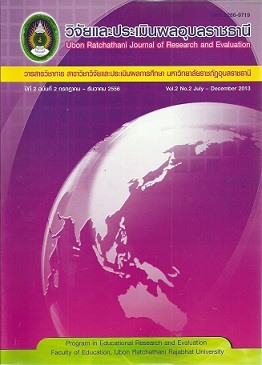A Development of Analytical Thinking Skills in Science by the Inductive Approach for Prathom Suksa 6 Students of Ban Taboh School under the Jurisdiction of Ubon Ratchathani’s Educational Service Area 1
Keywords:
ทักษะการคิดวิเคราะห์ วิธีสอนแบบอุปนัย แบบวัดทักษะการคิดวิเคราะห์ การวิจัยปฏิบัติการ วิธีสอนแบบปกติAbstract
ABSTRACT
The aims of the research were 1) to study an operational development of analytically thinking skills of Prathom Suksa 6 (Grade 6) students, 2) to compare the outcomes of an operation after the development of analytically thinking skills via an inductive teaching approach and 3) the outcomes of a development of analytically thinking skills in a science subject of grade 6 students divided into two groups: one was taught by the inductive approach and the other by a conventional approach. The samples used in the research were 21 grade 6 students of Ban Taboh Schools in the second semester of 2012. The samples were derived by a cluster random sampling. The instruments were the test for thinking skills, achievement tests and daily records of teachers. Statistics used were independent t-test, and one sample test.
The research findings were as follows:
- Learning activities used by the inductive approach consisted of five stages: 1) preparation of students; 2) presentation of the samples for students to be able to compare; 3) comparison and collection of data by means of observation, retrieval and experiment to move to a new element of knowledge; 4) summary based on students’ activities; 5) application of knowledge students gained from the activities. Based on the analytic thinking skills, it was found that the learning activities allowed the students to do activities by themselves; they had chance to mutually help one another. Besides, the teachers’ personality could be promising. The students wanted the teachers to be friendly to them and to take part in the activities.
- Considering the outcomes of the learning activities by using the test to measure the analytic thinking skills in science after the operation, it was found that the students had higher scores in four circuits, accounting for 77.75%. The students who passed the set criteria accounted for 100%.
- The comparison of the experimental group and the control group showed that the former that was taught by the inductive approach had higher achievement than the latter taught by the conventional approach with a statistical significance of .01.
References
จำเรียง ยศบุญเรือง. การพัฒนาทักษะการคิดวิเคราะห์ของนักเรียนชั้นประถมศึกษาปีที่ 2 โดยใช้เทคนิคไฟว์ ดับเบิ้ลยู วัน เอช. วิทยานิพนธ์ศึกษาศาสตรมหาบัณฑิต มหาวิทยาลัยเชียงใหม่, 2550.
ชวนชัย เชื้อสาธุชน. สถิติเพื่อการวิจัย. อุบลราชธานี: คณะครุศาสตร์ มหาวิทยาลัยราชภัฏอุบลราชธานี, 2551.
ธีรวุฒิ เอกะกุล. การวิจัยปฏิบัติการ. พิมพ์ครั้งที่ 3. อุบลราชธานี: ยงสวัสดิ์อินเตอร์กรุ๊ป, 2553.
พิกุล ตระกูลสม. การปฏิบัติการพัฒนากิจกรรมการเรียนที่เน้นผู้เรียนเป็นสำคัญวิชาวิทยาศาสตร์เรื่อง โลกและการเปลี่ยนแปลงรูปแบบซิปปา. วิทยานิพนธ์ศิลปศาสตรมหาบัณฑิต มหาวิทยาลัยราชภัฏอุบลราชธานี, 2552.
ภัชราพร ปริโยทัย. การพัฒนาชุดฝึกทักษะการคิดวิเคราะห์ วิชาวิทยาศาสตร์ประถมศึกษาปีที่ 3. วิทยานิพนธ์ครุศาสตรมหาบัณฑิต มหาวิทยาลัยราชภัฏอุบลราชธานี, 2551.
อุทัย บุญประเสริฐ. การวิจัยปฏิบัติการ(Action Research). การรับการศึกษาวารสารบริหารการศึกษาบัวบัณฑิต; ปีที่ 10 ฉบับที่ 10 (ตุลาคม 2552 - มกราคม 2553) : 51-52.
อุ่นเรือน หนูจันทร์. การศึกษาทักษะการคิดวิเคราะห์และความสามารถในการสรุปความคิดรวบยอดของนักเรียนชั้นประถมศึกษาปีที่ 4 ที่เรียนโดยใช้วิธีสอนแบบอุปนัย. วิทยานิพนธ์การศึกษามหาบัณฑิต มหาวิทยาลัยทักษิณ, 2551.
Downloads
Published
How to Cite
Issue
Section
License
1. บทความที่ตีพิมพ์ในวารสารนี้ได้มีการตรวจสอบการลอกเลียนงานวรรณกรรมแล้ว ไม่เกินร้อยละ 25
2. บทความที่ตีพิมพ์ในวารสารนี้เป็นข้อคิดเห็น ข้อค้นพบของผู้เขียนบทความ โดยผู้เขียนบทความต้องเป็นผู้รับผิดชอบต่อผลทางกฎหมายใด ๆ ที่อาจเกิดขึ้นจากบทความนั้น ๆ
3. บทความ ข้อมูล เนื้อหา รูปภาพ ฯลฯ ที่ได้รับการตีพิมพ์ในวารสารวิจัยและประเมินผลอุบลราชธานี ถือเป็นลิขสิทธิ์ของวารสารวิจัยและประเมินผลอุบลราชธานี หากบุคคลหรือหน่วยงานใดต้องการนำทั้งหมดไปเผยแพร่ต่อหรือเพื่อกระทำการใดๆ จะต้องได้รับอนุญาตเป็นลายลักษณ์อักษรจากวารสารวิจัยและประเมินผลอุบลราชธานีก่อนเท่านั้น และจะต้องมีการอ้างอิงวารสารวิจัยและประเมินผลอุบลราชธานี ฉบับนั้น ๆ ด้วย






